Introduction
In a world where health and well-being have become paramount, crafting a personalized weight loss care plan is more than just a trend; it's a vital step towards a healthier lifestyle. This journey begins with self-assessment and motivation, laying the groundwork for sustainable change.
By educating oneself about nutrition and physical activity, individuals can make informed decisions that align with their goals. However, the path to success is not a solitary one; building a supportive network and leveraging professional resources can significantly enhance the journey.
With practical strategies and psychological tools at their disposal, anyone can transform their aspirations into reality. This article delves into foundational steps, goal-setting techniques, dietary strategies, and the importance of professional support, empowering readers to take charge of their health and inspire those around them.
Foundational Steps to Crafting Your Weight Loss Care Plan
To embark on your journey towards crafting an effective personalized health loss care plan, consider these essential steps:
- Assess Your Current Situation: Begin by evaluating your current body mass, dietary habits, and physical activity levels. Keeping a journal for a week can be a valuable tool to track your eating patterns and exercise routines, providing insights into your lifestyle.
- Identify Your Motivation: Take a moment to reflect on your reasons for wanting to shed pounds. Whether it’s for health improvement, enhanced self-confidence, or increased energy levels, documenting your motivations will help keep them at the forefront of your journey.
- Educate Yourself: Equip yourself with knowledge about nutrition and exercise fundamentals. Comprehending the principles of nutritious eating and efficient workouts enables you to make informed choices that aid your goals for reducing body mass.
- Choose Your Approach: Select a method for reducing body mass that aligns with your preferences and lifestyle. This could be a structured diet plan, a tailored workout regimen, or a combination of both that feels right for you. Consider leveraging Foresight Health Coaching's personalized fitness coaching services, which are designed to create custom programs delivered through our app for lasting lifestyle changes. The app features progress tracking, access to nutrition resources, and community support to enhance your journey.
- Create a Support System: Surround yourself with a network of friends, family, or online communities who can provide encouragement and accountability. A robust support network can significantly boost your motivation and dedication to your fitness journey, and Foresight’s coaching community can act as an outstanding resource.
- Consider the Financial Benefits: It's important to recognize that customized body management care plans can lead to significant financial savings. For example, adults with Medicare who accomplished a 25% reduction in body mass were estimated to decrease their expenses by an average of $5,442. This statistic emphasizes the economic benefits of effective management strategies provided through Foresight’s programs, which feature flexible pricing structures to meet diverse needs.
- Prioritize Sleep: Sufficient rest is crucial for successful fat reduction. Studies indicate that dieters who experience sleeplessness for 14 days lose 55% less fat. This emphasizes the significance of including healthy sleep practices in your fitness strategy. By referencing insights from our workshops and resources, you can understand how sufficient rest can significantly affect your loss outcomes.
By integrating these steps into your personalized care plan with Foresight Health Coaching, you can create a comprehensive approach that not only supports your health goals but also provides valuable financial benefits. For detailed information on our membership options and how to utilize our services effectively, please refer to our user manuals and FAQs.
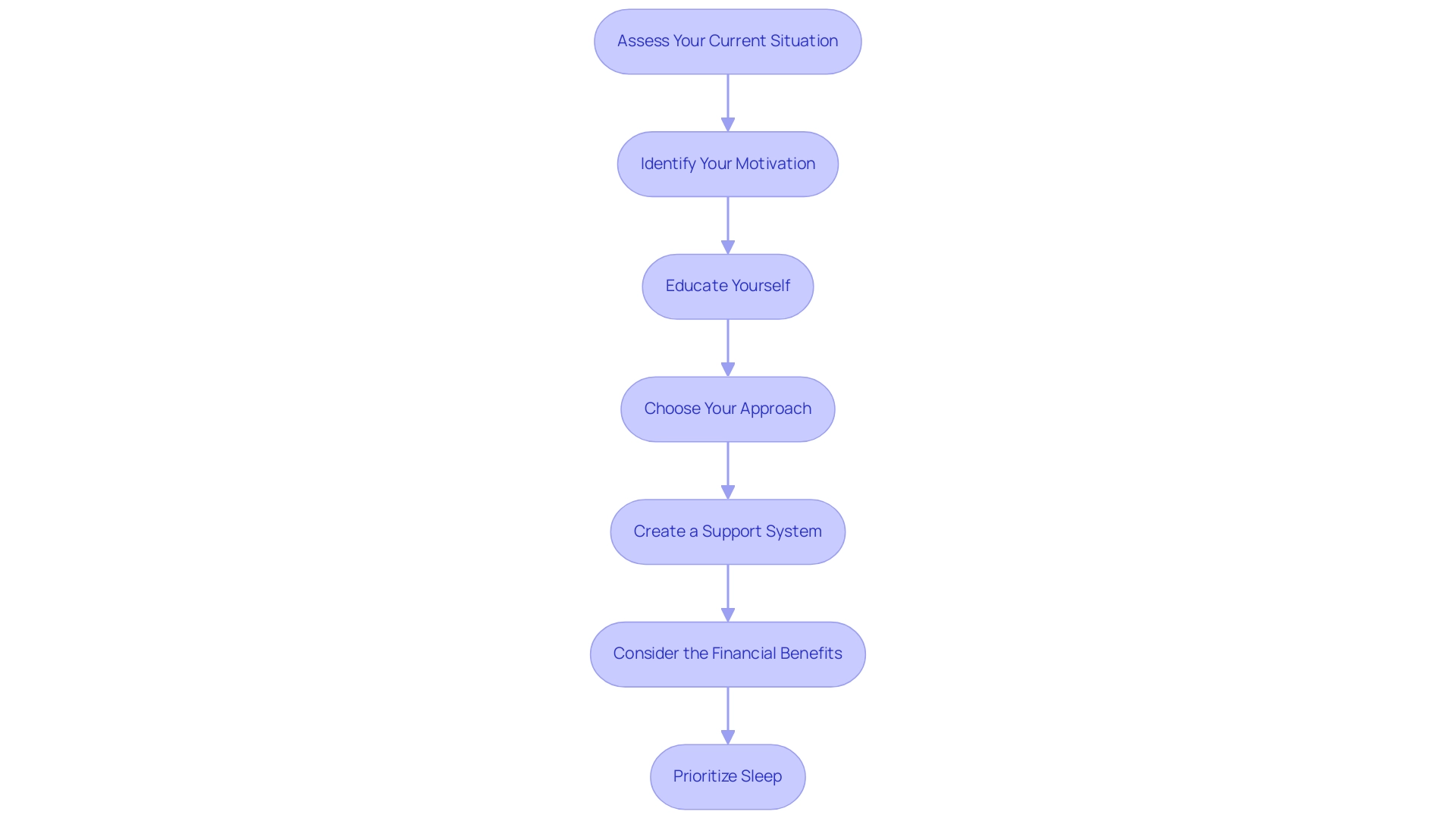
Setting Realistic Goals and Tracking Your Progress
To create effective management strategies for body mass and monitor progress, consider these motivational steps:
-
Define SMART Goals: Craft goals that are Specific, Measurable, Achievable, Relevant, and Time-bound. For instance, rather than simply stating, 'I want to lose pounds,' specify, 'I aim to lose 10 pounds in three months by exercising three times a week and adopting healthier eating habits.' This precision transforms your aspirations into actionable plans.
-
Break Goals into Smaller Milestones: Segment your overall objective into smaller, manageable milestones. Each time you achieve one of these milestones, celebrate your success to sustain motivation and commitment. This approach is reminiscent of the personalized support offered by experienced coaches within a weight loss care plan, which facilitates lasting lifestyle changes.
-
Track Your Progress: Utilize tools such as apps, journals, or spreadsheets to meticulously document your loss journey. Consistently document your mass, measurements, and emotional state to gain insights into your progress. Engaging in this weight loss care plan echoes the evidence-based techniques employed by knowledgeable professionals.
-
Adjust as Needed: Consistently review your progress and remain open to refining your goals and plans based on your experiences and outcomes. Embracing flexibility in a weight loss care plan is essential for long-term success, especially since recent research indicates that age impacts loss effectiveness, with older individuals potentially achieving better results through customized interventions.
In today's environment, it's crucial to acknowledge that 56 percent of US Gen Z consumers view fitness as a 'very high priority,' highlighting the importance of personalized approaches to maintaining health. By implementing these strategies, you not only empower yourself but also set a positive example for others, fostering a culture of health and well-being within your organization. Lex Hurley highlights the significance of individualized strategies in body control as part of an effective weight loss care plan, consistent with the results of research supported by the National Institute of Diabetes and Digestive and Kidney Diseases.
Furthermore, the case study titled 'Implications for Future Research' suggests that current guidelines on loss objectives may need to be revised to encourage larger goals for better outcomes, emphasizing the need for further research into maintaining participant engagement and the effects of tailored interventions based on motivation. As you embark on this journey, remember that your commitment to setting realistic and motivating goals is key to transforming health outcomes. “Thanks to the tailored coaching I received, I not only lost pounds but also gained the confidence to sustain my healthy lifestyle.” - A satisfied client
Contact us today to begin your personalized health journey and take control of your wellness!
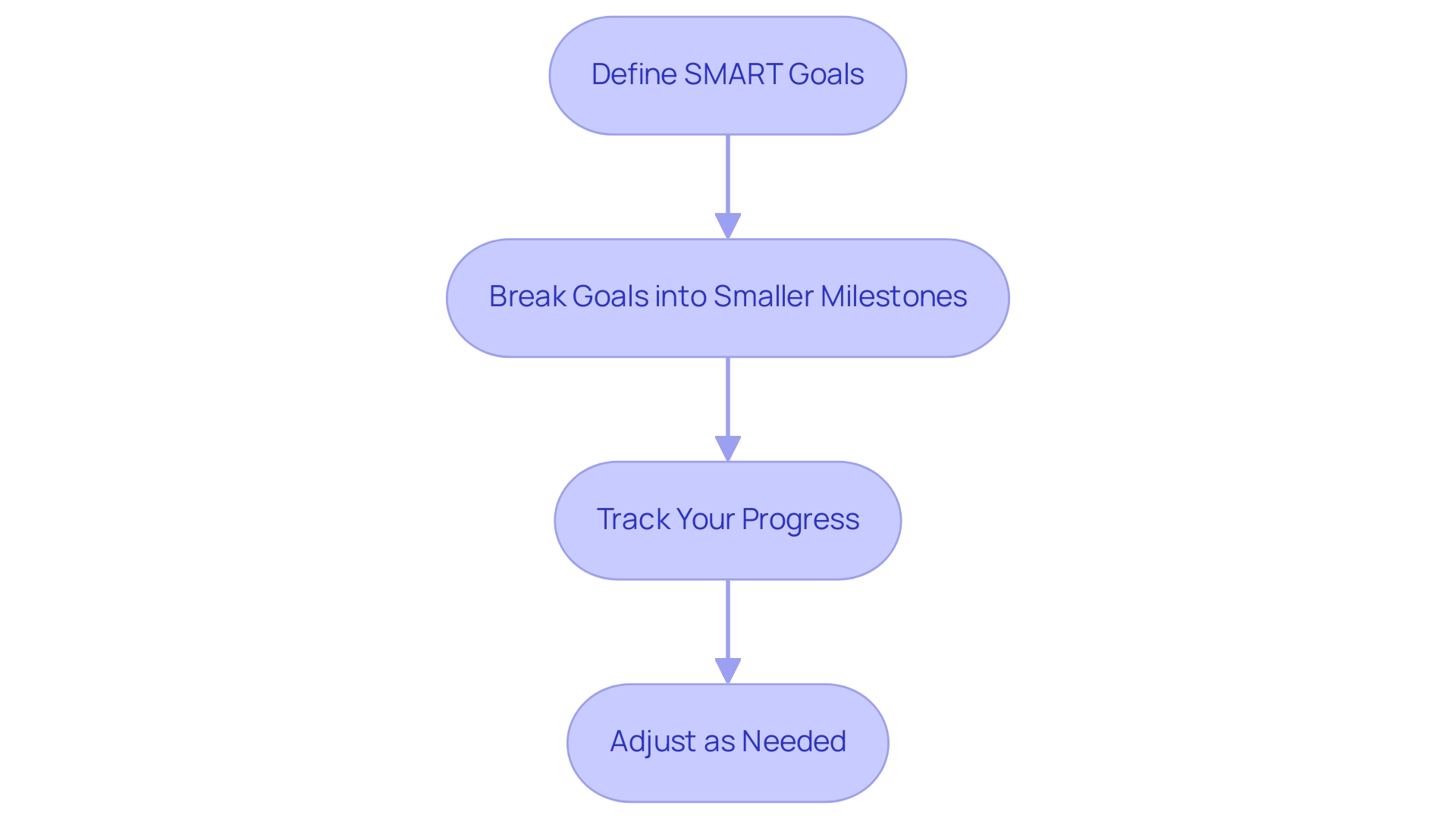
Nutrition: Key Dietary Strategies for Effective Weight Loss
Applying effective nutritional approaches is essential for the successful management of a weight loss care plan. In fact, a significant 60% of adults in the U.S. expressed a desire to live a healthier lifestyle in 2021, highlighting the importance of these strategies. Here are key approaches that can inspire lasting change:
- Focus on Whole Foods: Embrace whole, unprocessed foods, such as vibrant fruits, crisp vegetables, lean proteins, whole grains, and healthy fats. These nutrient-dense options not only provide essential vitamins and minerals but also help maintain satiety, making it easier to manage cravings and overeating. Significantly, case studies show that among Gen Z men, 63% concentrate exclusively on exercise, while 40% of Gen X women emphasize dieting, indicating differing strategies for managing body composition based on gender and generation.
- Portion Control: Mindfulness in portion sizes can significantly influence success in reducing body mass. Consider using smaller plates or measuring your food to prevent unintentional overeating. Expert opinions highlight that paying attention to portion sizes can lead to more sustainable eating habits.
- Stay Hydrated: Sufficient hydration is frequently disregarded in body control approaches. Drinking at least 8 cups of water daily can help differentiate between thirst and hunger, reducing the likelihood of unnecessary snacking.
- Weight loss care plan: A well-structured meal plan can significantly change your approach to dieting. By preparing your meals for the week, you ensure that healthy options are always on hand, which minimizes the temptation for impulsive eating and supports your weight loss care plan.
- Limit Sugary and Processed Foods: Reducing the intake of sugary snacks, beverages, and processed foods is essential. These items not only undermine fat loss efforts but also contribute to unhealthy cravings. According to recent statistics, a significant portion of the population recognizes the importance of nutrition in achieving health goals, with many adults actively seeking healthier lifestyle choices. Additionally, the CDC observes that non-Hispanic Whites, non-Hispanic Blacks, and Hispanic adults are more inclined to participate in programs to reduce mass than non-Hispanic Asian adults, highlighting the varied methods of addressing body composition across demographics.
By implementing these methods, you can cultivate a healthier atmosphere for yourself and your team, creating the foundation for effective control of body composition and improved overall wellness.
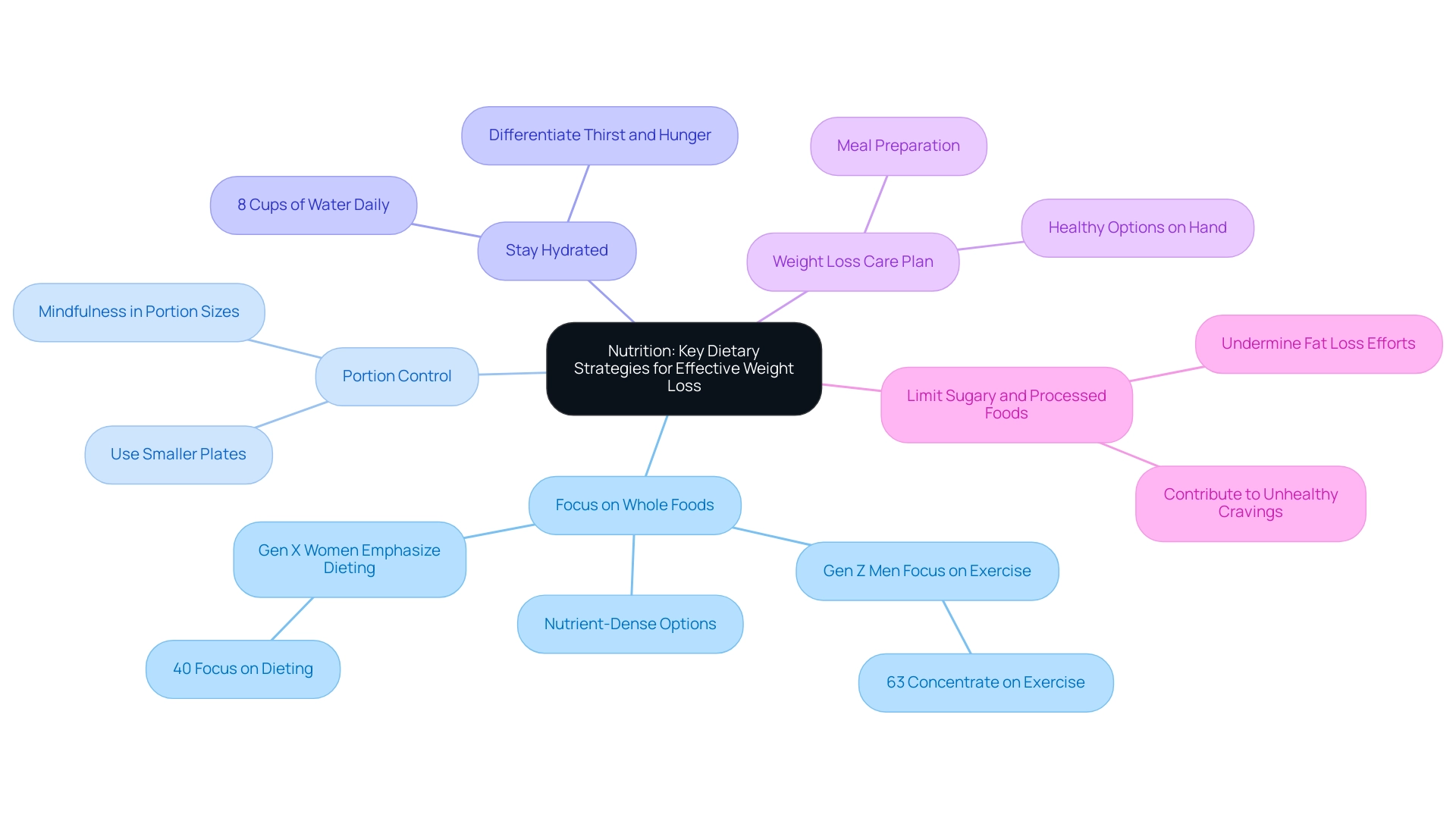
Mindset and Motivation: Psychological Tools for Weight Loss Success
To cultivate a positive mindset and sustain motivation, it's essential to incorporate powerful psychological tools into your management strategy:
-
Practice Self-Compassion: Embrace kindness towards yourself during inevitable setbacks. Acknowledge that the body transformation journey is filled with challenges; these experiences do not define your progress but rather contribute to your growth.
-
Visualize Success: Dedicate time to vividly imagine your goals and the numerous benefits that come from achieving them. This practice not only fuels motivation but strengthens your commitment to the journey ahead. As Richard Joseph, MD, aptly puts it,
The most important determinants of maintaining changes in behavior are those that cement transformations in habits.
Visualization can be a crucial part of this behavioral change. Significantly, recent research emphasizes that dietary, self-monitoring, and psychological methods contribute to 49.5% of the variance in distinguishing successful body management maintainers from those who are stable, underscoring the importance of these tools. Create affirmations that are part of your weight loss care plan: craft positive affirmations specifically tailored to your journey of losing pounds.
Regularly repeating these affirmations can reinforce your dedication and bolster your confidence, creating a powerful mental framework for your weight loss care plan.
-
Stay Mindful: Engage in mindfulness practices, such as meditation or deep breathing exercises. These techniques not only help manage stress but also keep you grounded and present, enhancing your overall journey.
-
Reward Yourself: Establish a reward system for achieving milestones along your path. Honor your achievements with non-food incentives, such as buying a new exercise outfit or taking a well-deserved day off, which can greatly enhance your motivation. Additionally, a recent study evaluating an updated LS by eliminating a non-related item and including a larger sample size illustrates the continuous investigation in psychological approaches for managing body composition.
As shown by the statistical analysis techniques utilized in various studies, including ANCOVA and regression models, these psychological approaches have been validated for their effectiveness. As recent research suggests, psychological techniques like these can greatly influence body composition results, aiding in lasting success.
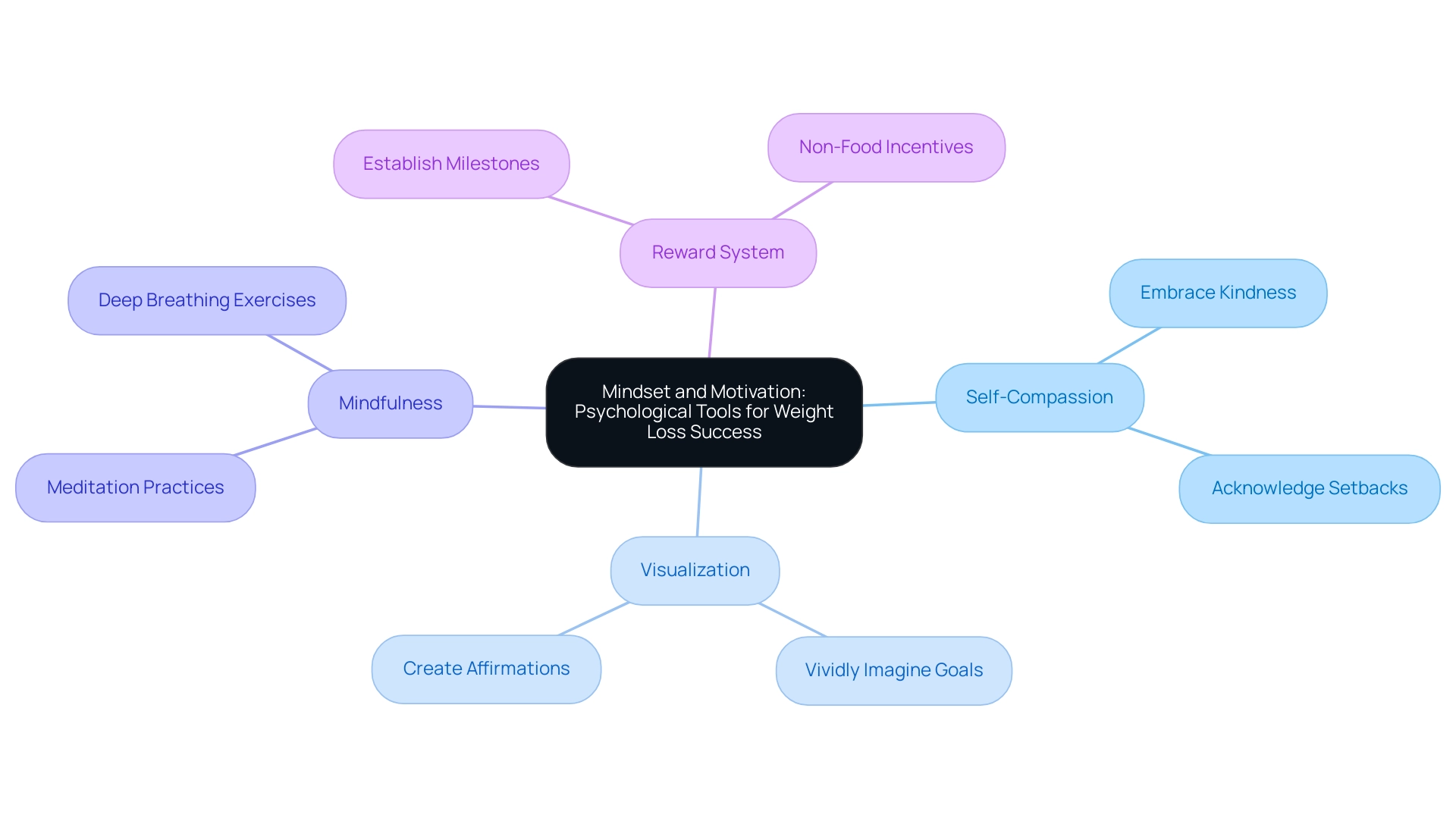
Leveraging Professional Support for Your Weight Loss Journey
Starting a fitness journey can be difficult, but utilizing expert assistance through a weight loss care plan and customized corporate wellness initiatives can greatly improve your likelihood of achievement. Here are several options to consider:
-
Consult a Registered Dietitian: A registered dietitian can offer personalized meal plans and nutritional advice that align with your specific health needs and preferences.
Their expertise ensures that you receive tailored strategies in your weight loss care plan for effective management of your health, addressing both your dietary habits and lifestyle while contributing to a healthier workforce.
-
Join a Weight Loss Program: Programs such as Weight Watchers, which boasts 5 million members and generated $334 million in revenue in the second quarter of 2020, offer structured support, accountability, and a sense of community. These components can greatly enhance motivation and commitment to fitness objectives.
As Dana Vioreanu states,
By leveraging customization, these offerings not only support individuals in achieving healthier body conditions but also help mitigate the long-term health and economic burdens associated with obesity.
This emphasizes the significance of professional assistance in attaining a weight loss care plan and promoting sustainable health management and a productive team atmosphere.
-
Work with a Personal Trainer: A personal trainer can create a workout plan tailored to your individual goals and fitness level.
Their guidance can help you stay accountable and motivated, making it easier to integrate physical activity into your daily routine—an essential aspect of maintaining employee well-being and enhancing productivity.
-
Therapeutic Support: If you find that emotional eating or psychological barriers are hindering your progress, collaborating with a therapist or counselor specializing in managing body composition can be invaluable. Addressing these emotional aspects is crucial for a weight loss care plan and can lead to a more engaged and empowered team.
-
Utilize Online Resources: Explore various online platforms that offer virtual coaching, meal planning, and community support. These resources can provide extra motivation and organization to your weight loss care plan efforts while highlighting the significance of a supportive workplace culture.
Research shows that participants in structured loss programs often achieve better results. For example, research shows that dieters who get sufficient sleep shed 55% more fat compared to those who are deprived of rest for prolonged durations. This highlights the multifaceted nature of weight management and the importance of integrating a weight loss care plan with professional support into your journey.
Furthermore, companies that implement corporate wellness programs tend to have healthier employees, reducing absenteeism and fostering a thriving work environment.
At Foresight Health Coaching, we understand the unique challenges your team faces, such as balancing demanding workloads with health goals. By partnering with us, you can create a culture that prioritizes employee well-being.
Schedule a consultation today to learn how our tailored programs can support your team's health and productivity.
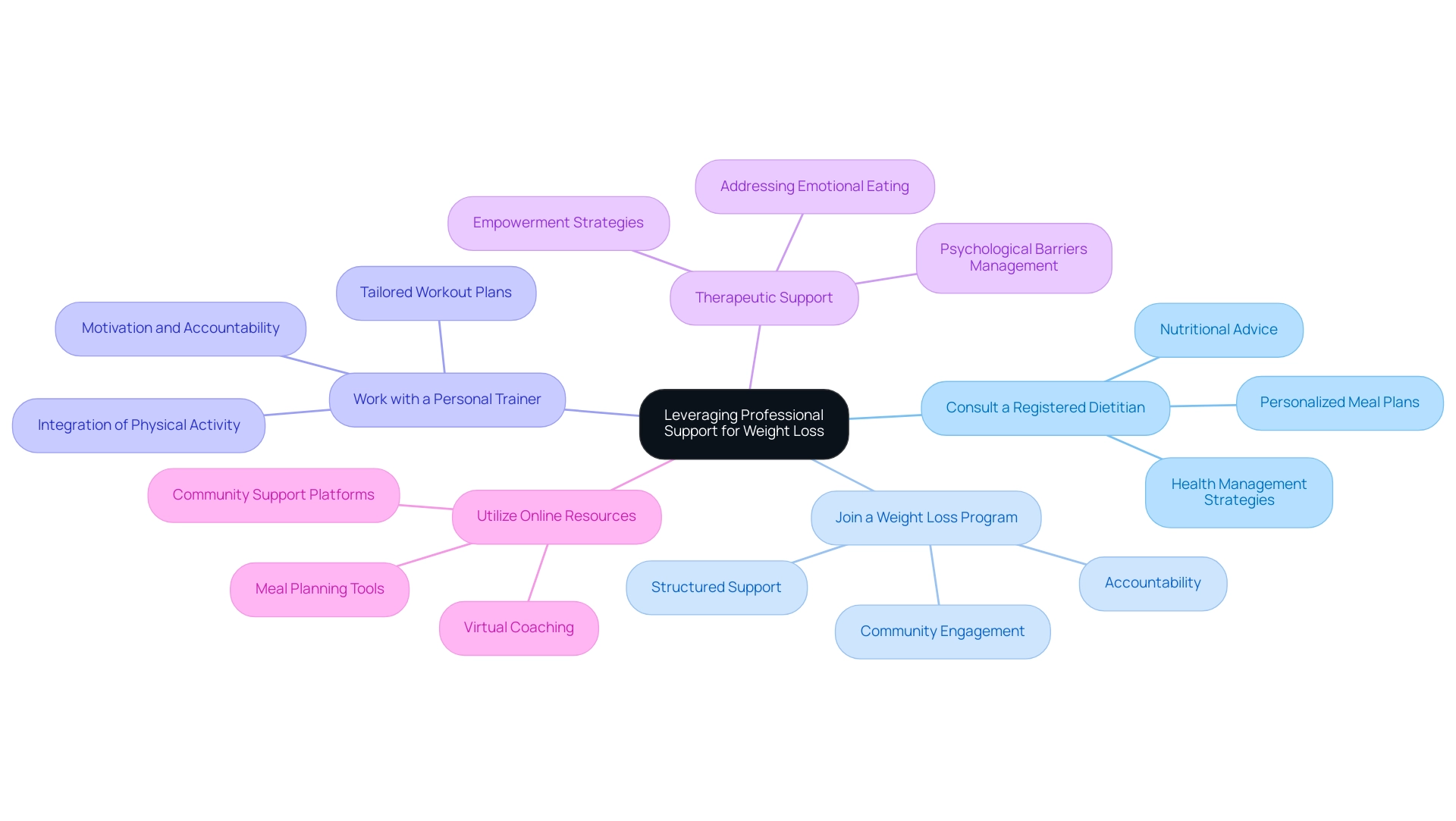
Conclusion
Crafting a personalized weight loss care plan is a transformative journey that encompasses self-awareness, education, and support. By assessing individual circumstances and identifying motivations, individuals can lay a solid foundation for achieving their health goals. Embracing practical strategies, such as:
- Setting SMART goals
- Tracking progress
Empowers individuals to stay focused and committed to their aspirations.
Nutrition plays a pivotal role in this journey, with dietary strategies emphasizing:
- Whole foods
- Portion control
- Hydration
These approaches not only support weight loss but also foster healthier lifestyle habits. Additionally, cultivating a positive mindset through self-compassion and visualization can enhance motivation, while professional support from registered dietitians, trainers, and wellness programs can provide the necessary guidance to navigate challenges effectively.
Ultimately, prioritizing well-being through a structured weight management plan not only leads to personal health improvements but also creates a ripple effect within communities and workplaces. By investing in health and well-being, individuals can inspire those around them, fostering a culture of wellness that benefits everyone. Now is the time to take action, embrace these strategies, and embark on a journey towards a healthier, more fulfilling life.




